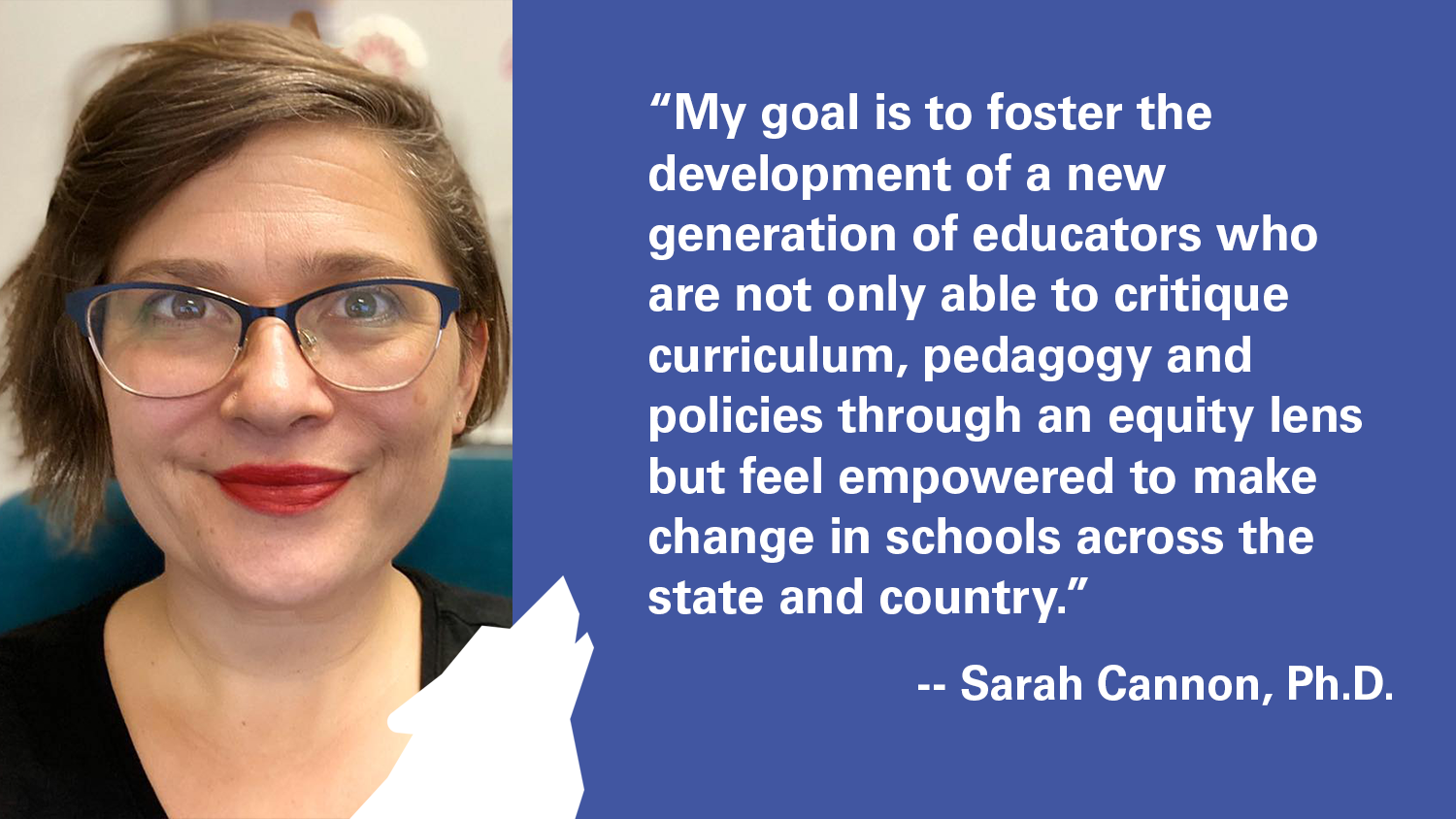Pack IDEAs Faculty Spotlight: Sarah Cannon, Ph.D.

In each edition of Pack IDEAs (Inclusion, Diversity, Equity, and Access), a newsletter released by the NC State College of Education Change Agent Task Force, we highlight faculty, students and alumni who have expertise and experiences that align with advancing diversity, equity, and inclusion (DEI) within the college. In becoming an anti-racist college community, we must deepen our commitment to creating and sustaining a healthy teaching and learning community that uplifts the humanity of all people, but especially Black, Indigenous and people of color, who due to structural inequities are marginalized in education and society. The spotlight feature offers a counternarrative that celebrates and showcases the brilliance of individuals within our college community.
Sarah Cannon, Ph.D.
Assistant Director of Professional Education
Assistant Teaching Professor in the Department of Teacher Education and Learning Sciences
How long have you been a faculty member at NC State? I have worked at NC State since August 2016; although, I was not technically faculty until later.
Why are diversity, equity, and inclusion in education important to you? This question is actually a difficult one to answer because issues related to diversity, equity, and inclusion have always been important to me; however, I didn’t always have a name for them. As a small child, I remember being taught that all people were equal so, I remember always getting really angry when people weren’t actually treated equally. This continued through my adolescence and into my adult years. Once I became an educator, I saw firsthand how inequities aren’t just individual acts, but part of a larger system that impacted my students in a real and tangible way. Doing my part to create more justice is a moral imperative.
Are you currently conducting research around the area of diversity, equity, and inclusion? If so, tell me a little about your research. Because I am a faculty member in the professional track, research is not a major component of my duties. Rather, my focus is on teaching and professional experiences for our teacher candidates. Because of this focus, I have worked to infuse diversity, equity, and inclusion (DEI) in our core courses (ED 204: Introduction to Teaching and ED 311/312: Principles of Assessment) and in our early field experiences, and have designed an equity course as a GEP, so our candidates from all programs as well as students from across the university can consider how equity and education intersect. We have presented on these efforts at regional and national conferences to share what we have learned about infusing DEI into all parts of educator preparation. Next, I will be collaborating with faculty and instructors from across the departments to focus our efforts on developing anti-racist educators through intentional content in coursework, field experiences and other experiences for our candidates.
What are you hoping to accomplish as a result of your work, and how do you expect it to impact the field of education and learners? My goal is to foster the development of a new generation of educators who are not only able to critique curriculum, pedagogy and policies through an equity lens but feel empowered to make change in schools across the state and country.
Are there community projects and initiatives you are involved in related to diversity, equity, and inclusion? Tell me about those projects. Outside of my work within the college, I have been a founding member of the new Diversity, Equity, and Inclusion Special Interest Group within the North Carolina Association of Colleges of Teacher Education. This group is working to bring EPPs across the state together to address issues related to DEI and teacher preparation across the state such as the recruitment, support and retainment of teachers of color.
What do you hope to teach future educators and scholar-leaders about equity and inclusion in education? How do you incorporate that into your instruction and curriculum? I hope my future educators are equity literate – that they are able to identify when inequities are occurring in their classrooms and in the school community at large. I hope my future educators have the tools to be culturally sustaining in their classrooms and to be advocates within the larger school community. Lastly, I hope these future educators know why it’s important to consider the needs of students whose identities have been marginalized in our schools and in society. It might seem like a silly thing to point out, but I think new educators sometimes forget the humanity of their students. We are so wrapped up in lesson plans and classroom management that we see our students as one big amalgamation, and not as individual human beings who need to be seen and valued. So, I hope our future educators see their students, really see them, and honor them and fight for them so that education is a building block and not an obstacle.
For other educators and teacher-leaders interested in learning more about social justice and anti-racist education, what are two resources you would recommend? If you are looking for a community of like-minded educators, I would check out Liberate and Chill, which features a really outstanding group of educators and scholars who are creating an intentional community. I have an extensive list of books, but for me, it all begins and ends with Paulo Freire’s Pedagogy of the Oppressed. I read my first excerpt as an undergrad, and I just keep coming back to it. It will change your life or at least make you question things really hard.
Is there anything else you’d like to share with the College of Education community? Take care of yourself and take care of other people. This was obviously always important, but I think we’ve had a series of stark reminders of just how important this is, and how much of it we are missing.
- Categories:


